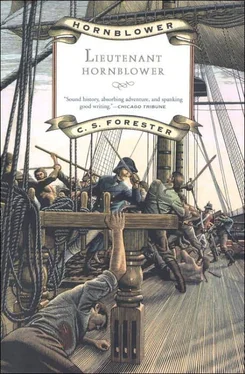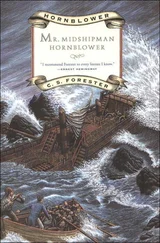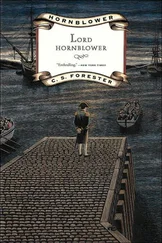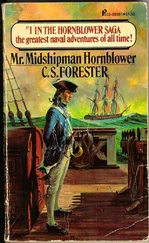“You’ll have plenty more if it’s war,” Hornblower said; and Bush shrugged his shoulders.
A thump on the door announced the arrival of the maid of all work of the house, a can of hot water in each hand. Her ragged dress was too large for her—handed down presumably from Mrs Mason or from Maria—and her hair was tousled, but she, too, turned wide eyes on Hornblower as she brought in the hot water. Those wide eves were too big for her skinny face, and they followed Hornblower as he moved about the room, and never had a glance for Bush. It was plain that Hornblower was as much the hero of this fourteenyearold foundling as he was of Maria.
“Thank you, Susie,” said Hornblower; and Susie dropped an angular curtsey before she scuttled from the room with one last glance round the door as she left.
Hornblower waved a hand at the washhand stand and the hot water.
“You first,” said Bush.
Hornblower peeled off his coat and his shirt and addressed himself to the business of shaving. The razor blade rasped on his bristly cheeks; he turned his face this way and that so as to apply the edge. Neither of them felt any need for conversation, and it was practically in silence that Hornblower washed himself, poured the wash water into the slop pail, and stood aside for Bush to shave himself.
“Make the most of it,” said Hornblower. “A pint of fresh water twice a week for shaving’ll be all you’ll get if you have your wish.”
“Who cares?” said Bush.
He shaved, restropped his razor with care, and put it back into his roll of toilet articles. The scars that seamed his ribs gleamed pale as he moved. When he had finished dressing he glanced at Hornblower.
“Chops,” said Hornblower. “Thick chops. Come on.”
There were several places laid at the table in the diningroom opening out of the hall, but nobody else was present; apparently it was not the breakfast hour of Mrs Mason’s other gentlemen.
“Only a minute, sir,” said Susie, showing up in the doorway for a moment before hurrying down into the kitchen.
She came staggering back laden with a tray; Hornblower pushed back his chair and was about to help her, but she checked him with a scandalised squeak and managed to put the tray safely on the side table without accident.
“I can serve you, sir,” she said.
She scuttled back and forward between the two tables like the boys running with the nippers when the cab was being hove in. Coffeepot and toast, butter and jam, sugar and milk, cruet and hot plates and finally a wide dish which she laid before Hornblower; she took off the cover and there was a noble dish of chops whose delightful scent, hitherto pent up, filled the room.
“Ah!” said Hornblower, taking up a spoon and fork to serve. “Have you had your breakfast, Susie?”
“Me, sir? No, sir. Not yet, sir.”
Hornblower paused, spoon and fork in hand, looking from the chops to Susie and back again. Then he put down the spoon and thrust his right hand into his trouser pocket.
“There’s no way in which you can have one of these chops?” he said.
“Me, sir? Of course not, sir.”
“Now here’s half a crown.”
“Half a crown, sir!”
That was more than a day’s wages for a labourer.
“I want a promise from you, Susie.”
“Sir—sir—!”
Susie’s hands were behind her.
“Take this, and promise me that the first chance that comes your way, the moment Mrs Mason lets you out, you’ll buy yourself something to eat. Fill that wretched little belly of yours. Faggots and Pease pudding, pig’s trotters, all the things you like. Promise me.”
“But, sir—”
Half a crown, the prospect of unlimited food, were things that could not be real.
“Oh, take it,” said Hornblower testily.
“Yes, sir.”
Susie clasped the coin in her skinny hand.
“Don’t forget I have your promise.”
“Yes, sir, please, sir, thank you, sir.”
“Now put it away and clear out quick.”
“Yes, sir.”
She fled out of the room and Hornblower began once more to serve the chops.
“I’ll be able to enjoy my breakfast now,” said Hornblower selfconsciously.
“No doubt,” said Bush; he buttered himself a piece of toast, dabbed mustard on his plate—to eat mustard with mutton marked him as a sailor, but he did it without a thought. With good food in front of him there was no need for thought, and he ate in silence. It was only when Hornblower spoke again that Bush realised that Hornblower had been construing the silence as accusatory of something.
“Half a crown,” said Hornblower, defensively, “may mean many things to many people. Yesterday—”
“You’re quite right,” said Bush, filling in the gap as politeness dictated, and then he looked up and realised that it was not because he had no more to say that Hornblower had left the sentence uncompleted.
Maria was standing framed in the diningroom door; her bonnet, gloves, and shawl indicated that she was about to go out, presumably to early marketing since the school where she taught was temporarily closed.
“I—I looked in to see that you had everything you wanted,” she said. The hesitation in her speech seemed to indicate that she had heard Hornblower’s last words, but it was not certain.
“Thank you. Delightful,” mumbled Hornblower.
“Please don’t get up,” said Maria, hastily and with a hint of hostility, as Hornblower and Bush began to rise. Her eyes were wet.
A knocking on the street door relieved the tension, and Maria fled to answer it. From the diningroom they heard a masculine voice, and Maria reappeared, a corporal of marines towering behind her dumpy form.
“Lieutenant Hornblower?” he asked.
“That’s me.”
“From the admiral, sir.”
The corporal held out a letter and a folded newspaper. There was a maddening delay while a pencil was found for Hornblower to sign the receipt. Then the corporal took his leave with a clicking of heels and Hornblower stood with the letter in one hand and the newspaper in the other.
“Oh, open it—please open it,” said Maria.
Hornblower tore the wafer and unfolded the sheet. He read the note, and then reread it, nodding his head as if the note confirmed some preconceived theory.
“You see that sometimes it is profitable to play whist,” he said, “in more ways than one.”
He handed the note over to Bush; his smile was a little lopsided.
SIR [ 1 1 read Bush
]
It is with pleasure that I take this opportunity of informing you in advance of any official notification that your promotion to Commander is now confirmed and that you will shortly be appointed to the Command of a Sloop of War.
“By God, sir!” said Bush. “Congratulations. For the second time, sir. It’s only what you deserve, as I said before.”
“Thank you,” said Hornblower. “Finish reading it.”
The arrival at this moment of the Mail Coach with the London newspapers [ 2 2 said the second paragraph
] enables me to send you the information regarding the changed situation without being unnecessarily prolix in this letter. You will gather from what you read in the accompanying copy of the Sun the reasons why conditions of military secrecy should prevail during our very pleasant evening so that I need not apologise for not having enlightened you, while I remain,
Your obedient servant,
PARRY
By the time Bush had finished the letter Hornblower had opened the newspaper at the relevant passage, which he pointed out to Bush.
Message from HIS MAJESTY
House of Commons, March 8, 1803
The CHANCELLOR OF THE EXCHEQUER brought down the following message from HIS MAJESTY:
’His Majesty thinks it necessary to acquaint the House of Commons, that, as very considerable military preparations are carrying on in the ports of France and Holland, he has judged it expedient to adopt additional measures of precaution for the security of his dominions.
Читать дальше









